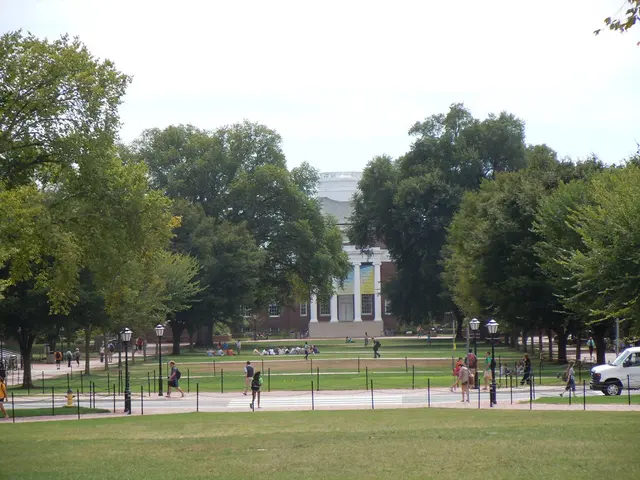"Leaving Behind the School Desks": The Transition of Boys to Favoring Home-Based Learning
Hitting the Homefront: The Rise of Alternative Education in Russia and the Parents Driving It
The education landscape in Russia is undergoing a significant shift, as an increasing number of parents opt for homeschooling their children - a trend highlighted by recent reports from the "News of Education" portal, particularly in the Omsk region. Here, we delve into the reasons behind this shift and explore the methods parents use to educate their children at home.
The Home Schooling Boom
By the end of 2024, an astounding 9,153 children in the Omsk region were enrolled in homeschooling, marking a 36% year-on-year surge. Moscow houses around 22,902 homeschooled children and St. Petersburg follows closely with 6,686. Notably, the Sverdlovsk region has seen the swiftest growth, with a staggering 75% increase in supporters of this education format [1].
The reasons behind this unmistakable upsurge are multifaceted, and parents' motivations often reflect global trends, albeit with some unique cultural and systemic factors at play.
Full Control Over Education
Savva, an Omsk student, switched from traditional schooling to homeschooling after completing primary school. When asked about the decision, Savva's mother, Darya, explains:
- Homeschooling doesn't equate to my husband and I just reading paragraphs to our child and solving problems with him. We chose an online platform for him - one that's convenient for me because there are problems in school for three years with him not being able to wake up at eight in the morning, teachers complaining that he doesn't write anything, that he's distracted and talks. We were so tired of the conflicts that we decided - no more school! [2]*
Savva's father, Alexei, also weighed in on the advantages of homeschooling:
- Whether Savva wrote something in his notebook isn't anyone's concern; not every day has homework, and when there is, it's in test mode. The only control is on the parents, so everything is left to the child. I think such education can only be for high school students who already understand why they need to learn.*
Interestingly, Savva takes the assessments on the same online platform. If he were to stay in his designated school, he would need to pass the material according to the program his educational institution had adopted at the end of the year.
Flexibility for a Busy Life
The advantages of homeschooling extend to a flexible schedule, which can be tailored around other commitments. Savva's parents found this aspect particularly valuable, as Savva is also enrolled in a music school, which he has excelled in.
- If the child is an athlete and often goes to training camps, it's also convenient. You don't need to ask for leave, you don't miss classes, you can open and listen to the lesson at any moment, instead of catching up with the class. You can go anywhere with the child at any time, instead of worrying about how to make a vacation coincide with holidays. [2]*
The pricing of these online platforms varies, with Savva's course costing his parents 36,000 rubles per academic year. If he were to be connected to live lessons, the cost would increase to 50,000 rubles per year.
Struggling to Keep Up
In stark contrast to Savva, Ilya, another seventh-grader, has returned to traditional schooling. His parents acknowledge they lack the competence to continue teaching Ilya according to the program.
- We won't go back to family education for at least the next two years. When we figure out what path he wants to take in the future, what education to get, we'll focus on those subjects in the graduation classes. The child is in his teenage years, honestly, we're already struggling. School has discipline and a clear daily schedule with a timetable that the children follow, and it's monitored. [2]*
Ilya's mother, Tatiana, also brought up the issue of socialization as a significant factor in her decision to send Ilya back to school.
- Of course, we're scared that he'll be bullied, we can't predict his reaction now, but he needs to go through solving tasks in interpersonal communication. [2]*To address Ilya's educational gaps, his parents opted for a private school instead of homeschooling. Today's parents are increasingly using their maternal capital to pay for their children's online courses or private schooling.
Schools in Need of Repair
The rise in home schooling can be attributed to several factors, one of which is the condition of traditional schools. Many schools have long been in need of repair, with their outdated and sometimes dilapidated appearance failing to attract students. In addition, the lack of qualified teaching staff and the stress and bullying experienced by students are concerns that some parents wish to avoid [3].
Private educational institutions, on the other hand, boast nicer facilities, newer desks, and a dedicated teaching staff for each subject. According to regional education officials, there are approximately 20 private schools in the Omsk region alone [3].
Expert Opinion
- It's impossible to be against education in principle - that's the first thing. The second, I think it's very right that the education law gives parents this opportunity. Now, the main thing, why parents choose homeschooling. Can everyone do it? Because it's thought that everyone can heal and teach, but it's a very complex thing. A serious downside is that, as far as I know, parents often rely only on their own experience, not knowing all the complexities and nuances of teaching, the physical and psychological peculiarities of age. They often turn to homeschooling when a conflict arises at school. They avoid solving the problem that led to the conflict, but haven't figured out the cause. Often, parents do this solely for their own convenience, forgetting about the child. [2]*While it's difficult to deny the benefits of homeschooling for some families, it's important to remember that this form of education has its drawbacks. Chief among these is the risk of inadequate teaching, considering that parents are often untrained in the complexities of instruction, and may be more concerned with their own convenience than their child's education [2].
Enrichment Data:Parents in Russia may choose homeschooling (referred to as "family education" or "home education" in Russian law) for various reasons, some of which mirror global trends. These reasons include religious and philosophical beliefs, safety and bullying concerns, a desire for personalized education, flexibility for travel or relocation, special educational needs, and health concerns. Russian families typically employ parent-led instruction, digital resources, external tutoring, and community collaboration while teaching their children at home. Additionally, homeschooled students generally undergo periodic assessments or state exams to validate their progress and receive an official certificate.
| Reason for Homeschooling | Typical Teaching Approach in Russia ||----------------------------|-------------------------------------------------|| Religious/philosophical | Parent-led instruction, tailored curriculum || Safety/bullying concerns | Home-based, online resources, parent supervision || Personalized education | Custom lesson plans, flexible pace || Relocation/travel | Portable education, digital platforms || Special educational needs | Individualized support, external tutors || Health concerns (e.g., COVID) | Home-based, digital learning |
Russian homeschooling families thus combine parent-led instruction with digital tools, community collaboration, and periodic assessments to provide a flexible and individualized education [1][2][4].
- With the increasing number of online education platforms, parents in Russia like Savva's, seek flexible learning options for their children, enabling them to balance their education with other commitments, such as music school or travel.
- While some families choose homeschooling for its benefits, like personalized education and flexibility, there's a risk of inadequate teaching when parents lack proper training in the complexities of instruction, which experts find concerning.








